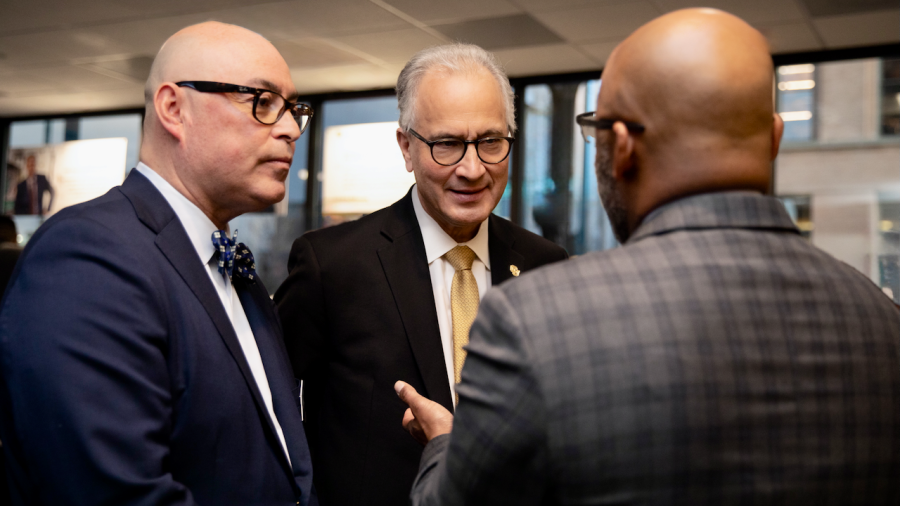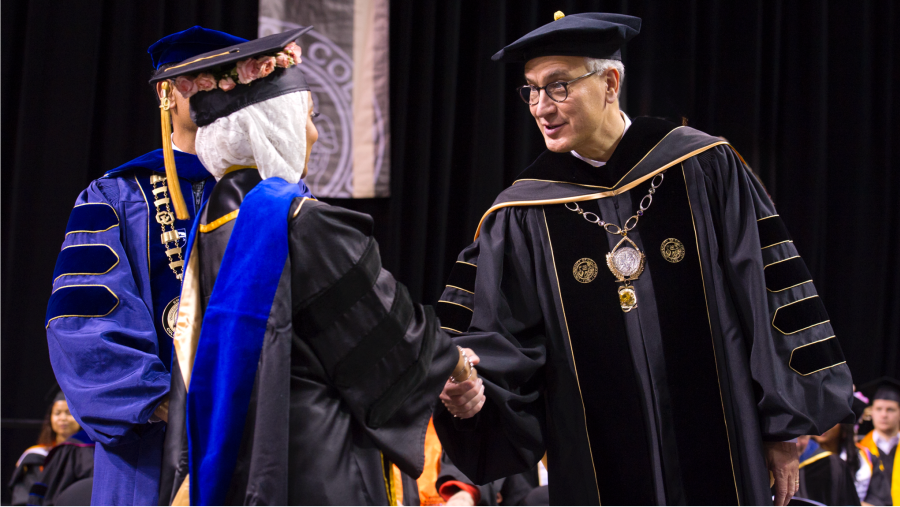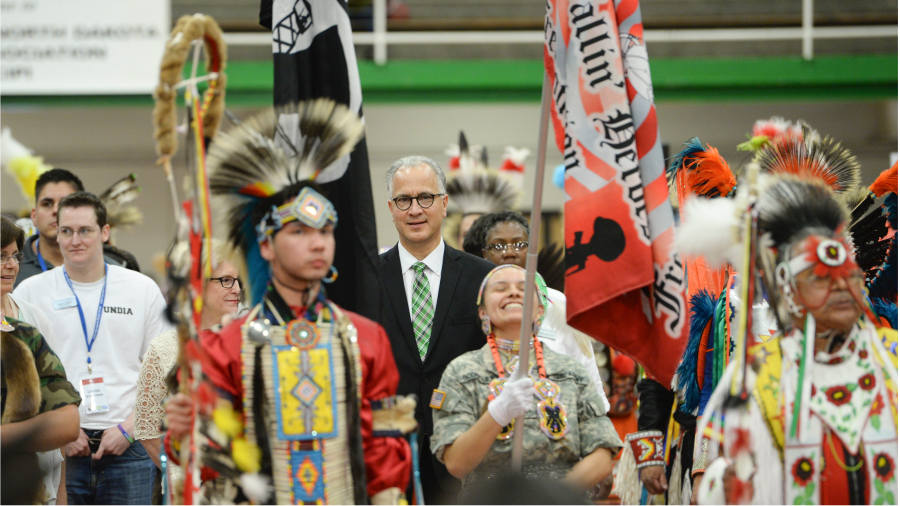
Leading Through Polarization
Mission First, Even When It’s Personally Costly
In divided times, principled restraint is often the most courageous—and effective—form of leadership.

Listening to Denver Mayor Michael Hancock, along with CU Regent Nolbert Chavez.
-
As a university president, U.S. Congressman, and business leader, I’ve often worked through moments of intense public pressure and political divide. I’ve learned that effective leadership in polarized times is not about posturing—it’s about protecting the institution, staying grounded in the mission, and modeling steady values amid the noise.
-
I’ve also learned that sometimes the most powerful thing a leader can do is abstain—not from responsibility, but from escalation.
A Transition Guided by Stewardship
As President of the University of Colorado System, I led through a time of profound disruption—from a global pandemic and financial shortfalls to rising political polarization. Yet even amid those headwinds, we delivered real results—and I was rated 'Exceeds Expectations' in my board evaluation.
-
Navigated a $396 million shortfall during the COVID-19 crisis
-
Developed and launched a bold, metrics-based strategic plan
-
Held net tuition flat for four years while investing in affordability
-
Improved graduation rates across all demographics
-
Elevated research and fundraising success
-
Strengthened student pipelines from rural and underserved communities
-
Recruited high-performing executive leaders with diverse experiences—selected on merit
-
When the Regents’ political majority shifted for the first time in 40 years—amid a period of intense national polarization—new expectations emerged regarding how far the university should go in implementing DEI-related initiatives. At the same time, one campus—CU Boulder—held a nonbinding faculty censure vote centered on perceived shortcomings in advancing those initiatives. While the censure was opposed by many faculty, did not reflect the views of CU’s other campuses and was based on selective claims, the broader dynamic became a catalyst for leadership transition.
-
Rather than personalize the moment or politicize the outcome, I chose stewardship over self-interest. The expectations that emerged went beyond what the courts had then defined as constitutionally permissible—expectations that would later become even more constrained by judicial rulings. I believed it was my duty to uphold those legal boundaries, even as others pushed further. But rather than escalate conflict, I prioritized institutional stability and facilitated a dignified transition—knowing that a public counteroffensive, however justified, could have undermined CU’s progress. In doing so, I protected the university’s momentum, mission, and long-term reputation.
-
At my final Board meeting, the Regents unanimously approved the strategic plan I led—including its inclusive excellence components—without revision. That same board later voted to name me President Emeritus, affirming the integrity of my service.
“Don’t fire the man who is making CU diverse.”—

In keeping with my commitment to institutional continuity, Debbie and I were pleased to reconnect with CU President Todd Saliman in September of 2025, who has carried forward CU’s mission with strong leadership and friendship.

-
Cultural Respect in Moments That Matter
-
At UND, during commencement, I paused before extending my hand to a Muslim woman student—waiting to see if she would offer hers. A small act, but a meaningful one. Respect begins with awareness, and leadership must be rooted in listening, not assumptions. Especially in divided times, attentiveness to lived experiences builds bridges where policies alone cannot.
A Fifth A: When Leadership Means Abstaining
-
In my book Shapeholders, I outlined four strategic responses leaders can take: Avert, Acquiesce, Advance, and Assemble. Reflecting on my time at CU, I now recognize a fifth: Abstain.
-
At times, the wisest course is to let the moment pass, to avoid pouring fuel on division, or to preserve institutional trust by stepping away from personal defense. That was my choice at CU when external pressure tried to politicize higher education. Rather than escalate or personalize, I put the university’s well-being first.
-
To abstain is not to retreat—it’s to act with discernment. Leadership isn’t always loud. Sometimes it’s steady, principled, and quiet in the face of provocation.
A Teachable Moment, Not a Defining One
During a 2020 forum on inclusion, I referenced the “Trail of Tears” without realizing the hurt that phrase still evokes. I apologized within the hour and used the experience to reflect, listen, and lead with greater care.
That moment didn’t define my record. Long before it—and after—I worked to strengthen partnerships with tribal nations, expand access for rural and first-generation students, and foster a respectful climate across the institutions I led. At UND, I oversaw a community-informed transition from the “Sioux” name to “Fighting Hawks” in compliance with NCAA policy, developed 2+2 transfer agreements with tribal colleges, and supported culturally grounded internship pathways. At CU, we launched the system’s first Indigenous land acknowledgment with regent approval and extended in-state tuition to students from Colorado’s federally recognized tribes.
Like any leader navigating complex cultural moments, I made mistakes—and sought to respond with humility, accountability, and action.

Debbie and I participating in the annual UND UND Wacipi Powwow.
What Governing Boards Can Say with Confidence
-
If asked about my departure from CU, a governing board can speak with clarity:
-
Led two public university systems through periods of national polarization without fueling it
-
Upheld constitutional principles—especially around free expression and equal treatment under the law
-
Earned the Foundation for Individual Rights and Expression’s top “Green” rating for free speech at both CU and UND
-
Made decisions based on mission and principle—not politics, pressure, or public noise
-
Protected institutional continuity by choosing dignified transitions over public conflict
-
Navigated a CU Boulder faculty censure that was nonbinding, narrowly focused, opposed by a sizable share of Boulder faculty, not joined by other campuses—yet became a flashpoint during a time of heightened national tension
-
Secured unanimous approval from the Board of Regents for an inclusive, metrics-based strategic plan even after the censure
-
Was rated “Exceeds Expectations” in CU performance review
-
Was named President Emeritus, affirming the Regents’ confidence in my leadership and long-term contributions
-
Know how to preserve institutional integrity while navigating complex governance and transitioning with respect
How This Shaped My Leadership Today
-
I remain proud of what we achieved at CU and UND—and more committed than ever to leading with clarity, humility, and resolve.
-
Polarization won’t disappear. But institutions thrive when leaders stay mission-focused, lead with care, and put service above self. That’s how I’ve led. And that’s how I’ll continue to serve.
📣 Voices of Support
-
“President Kennedy has been a stalwart partner with the CU Foundation in advancing philanthropic support for CU.”
-
“Mark Kennedy has done an outstanding job for Colorado and the university during a challenging period.”
-
“Donors only contribute to organizations in which they have confidence in the leadership. And the donor community has that confidence in President Kennedy.”
Faculty & Staff
"Some of the statements that are in the current motion do not fit with reality. I find it difficult to support a motion where some of the facts are not correct."
“Thank you for your steadfastness in truth, reasonableness, and logic—many at CU support you.”
“You have not failed at anything. I stand behind you in all you do.”
“Almost all progress and innovation at UND currently flows from the work you started.”
Alumni and Community
“Your vision for the future of education is spot on.”
“We are displeased and a little sickened by the orchestrated opposition to Kennedy based not on his qualifications but on his political affiliation.”
“From my point of view, it is not personal, so just continue to do what your heart says is the right thing. As leaders, we are the natural target for their frustrations.”
“I’ve been impressed by your leadership—especially on diversity and inclusion.”